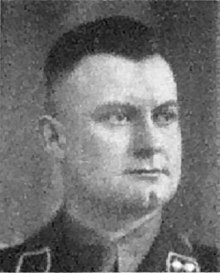Egbert Otto
Egbert Otto (born October 1, 1905 in Lichtenhagen , East Prussia , † October 19, 1968 in Hamburg ) was a German politician ( NSDAP , Association of Expellees ).
Live and act
Egbert Otto was born into a Catholic family in Lichtenhagen. From 1913 to 1921 he attended a humanistic high school in Allenstein . He then completed an agricultural apprenticeship from 1921 to 1922 at the Tatarren manor in the Darkehmen district in East Prussia . In 1923 he attended a course at the riding and driving school Insterburg and was also involved in the Hitler putsch . He then studied agriculture and economics at the Technical University in Munich until 1924 . He dropped out of college prematurely after the death of his father. According to the Reichstag handbooks, at an unspecified point in time, he was a volunteer in Reiter Regiment II. From 1926 to 1928 he worked as an agricultural officer.
In May 1928 Otto acquired the Rosenau estate in the Allenstein district . Around 1929 he also became member 168.135 of the National Socialist German Workers' Party (NSDAP). Soon afterwards he also joined the Sturmabteilung (SA), in which he achieved the rank of Standartenführer for Königsberg and a Sturmbannführer .
In July 1932 Otto was elected as his party's candidate for constituency 1 (East Prussia) in the Reichstag , to which he subsequently belonged without interruption until March 1936. He was also a member of the district assembly and the provincial assembly of the province of East Prussia .
In March 1933 Otto, as a member of the NSDAP parliamentary group, voted for the Enabling Act , which de facto meant the Reichstag's self-disempowerment by transferring legislative power to the government, which thus united the legislative and executive branches. In the "election" on November 12, 1933 - when only candidates loyal to the government "ran" on a unified list - Otto's mandate was extended, but in the following two and a half years as a "parliamentarian", as in the previous eight months, only the (at that time regarded as prestigious) function of an extras in Hitler's appearances against the backdrop of the Reichstag.
On July 18, 1933, Otto was appointed by the Minister of Agriculture Walter Darré, on the basis of an empowerment under Reich law, to be a “chief special commissioner for the province of East Prussia in all matters relating to the development of the state”. H. appointed regional farmer's leader in East Prussia. In addition, he was a member of the court of honor of the Reichsbauernrat. In 1935 he resigned from his seat as a member of the German Reichstag.
In the Second World War he did military service as an officer in the Association of Artillery Regiment 11 and was later interned in Soviet captivity until 1947. In 1948 he was one of the founders of the East Prussian Landsmannschaft , of which he had been a board member since 1952. He built up the home information center for the Olsztyn district and Warmia and also managed it. From 1952 to 1961 he was also the district representative of the Allenstein-Land district. In 1956 he became a managing board member and in 1961 federal managing director of the East Prussian Landsmannschaft. In addition, he was deputy spokesman for the Landsmannschaft at the Association of Expellees. He was also the publishing director of the Ostpreußenblatt for many years .
literature
- Erich Stockhorst: 5000 people. Who was what in the 3rd Reich . Arndt, Kiel 2000, ISBN 3-88741-116-1 (unchanged reprint of the first edition from 1967).
- Rohrer, Christian. National Socialist Power in East Prussia. Colloquia Baltica 7/8. Contributions to the history and culture of Central Europe. Martin Meidenbauer Verlagbuchhandlung, Munich, 2006. ISBN 3-89975-054-3 .
Web links
- Egbert Otto in the database of members of the Reichstag
Individual evidence
- ↑ Rohrer, Christian. National Socialist Power in East Prussia. Colloquia Baltica 7/8. Contributions to the history and culture of Central Europe. Martin Meidenbauer Verlagbuchhandlung, Munich, 2006, p. 593
- ^ The Ostpreußenblatt, volume 43, 1968, p. 1
- ↑ Rohrer, Christian. National Socialist Power in East Prussia. Colloquia Baltica 7/8. Contributions to the history and culture of Central Europe. Martin Meidenbauer Verlagbuchhandlung, Munich, 2006, p. 593
- ↑ Rohrer, Christian. National Socialist Power in East Prussia. Colloquia Baltica 7/8. Contributions to the history and culture of Central Europe. Martin Meidenbauer Verlagbuchhandlung, Munich, 2006, p. 593
- ↑ Gustavo Corni and Horst Gies : Bread, Butter, Kanonen , p. 235.
- ^ A b Ernst Klee : The cultural lexicon for the Third Reich. Who was what before and after 1945. S. Fischer, Frankfurt am Main 2007, ISBN 978-3-10-039326-5 , p. 445.
- ^ The Ostpreußenblatt, volume 43, 1968, p. 1
- ↑ The Ostpreußenblatt, part 43, 1968, p. 1
- ^ The Ostpreußenblatt, volume 43, 1968, p. 1
- ↑ 32nd homeland yearbook of the district community Allenstein-Land e. V., Christmas 2001, p. 195
- ↑ 32nd homeland yearbook of the district community Allenstein-Land e. V., Christmas 2001, p. 195
- ^ The Ostpreußenblatt, volume 43, 1968, p. 18
| personal data | |
|---|---|
| SURNAME | Otto, Egbert |
| BRIEF DESCRIPTION | German politician (NSDAP, Federation of Expellees), MdR |
| DATE OF BIRTH | October 1, 1905 |
| PLACE OF BIRTH | Lichtenhagen |
| DATE OF DEATH | 19th October 1968 |
| Place of death | Hamburg |
